Listen to This Article:
Chef Rodney Smith wants every guest to experience a “Ratatouille moment” — that rush of warmth, nostalgia, and belonging that takes you back to your grandmother’s table, a family reunion, or a childhood kitchen filled with the smell of biscuits baking from scratch.
Food is way more than just sustenance to him—it’s a vessel for memory, culture, and connection. Through his work at the acclaimed Bread and Butterfly and his immersive pop-up dinner series under Southern Child, Rodney creates more than just meals. He creates moments.
A graduate of Auguste Escoffier School of Culinary Arts’ online Culinary Arts program, Chef Rodney has transformed his family’s Southern roots and rich heritage into a bold culinary voice that’s capturing attention across Atlanta and beyond.
With future collaborations on the horizon and his 1619 Dinner Series continuing to grow, Rodney isn’t just sharing food — he’s sharing home, history, and healing, one unforgettable plate at a time. And he’s just getting started.
Early Memories That Shaped a Passion
For as long as Chef Rodney can remember, his dad, a Marine, was in the kitchen experimenting with food while trying to feed the family.
“My first love for food was a peanut butter cookie he made from scratch,” Chef Rodney recalls, “which was so delicious.” His dad’s cookies were so good that Rodney often got caught (and got in trouble for) sneaking one.
Trouble or not, later in life, he realized his love for food stemmed from the enjoyment of watching his father make those homemade cookies for the family. But his connection to cooking wasn’t just about the food itself.
Good food was simply a part of life for him growing up in Tennessee and the Carolinas. But when asked about his first food memories, it wasn’t the food that came to mind. It was the family gatherings.
During his childhood, Chef Rodney spent lots of time with his mother’s side of the family in North Carolina, where he experienced traditional Southern meals. Whole hog barbecues, hush puppies, and collard greens were staples of these large family meals.
These childhood experiences began to form a foundation of emotional connection to food, tradition, and togetherness. And while a career as a chef wasn’t always his dream, he’s always wanted to work in the food industry.
“I always said I was going to own a business,” Chef Rodney says. “I said I was going to own a restaurant, but I didn’t think I would be the chef.”
From Food Industry Management to Finding His Calling
Pursuing his dream to own a restaurant, Rodney started working in the food industry. His first management experience was at the fast-casual pizza joint, Uncle Maddio’s, as a young adult. Before long, he became a General Manager (GM) at Bojangles, a Cajun-style Southern comfort chain and then later, he worked as a GM at the fast-casual chain, Chipotle Mexican Grill.
Throughout his time as a GM, Rodney began to explore other options in the food industry. His passion for food and creativity continued to grow, and although he was doing well in his position, he started to want something different.
“The passion, the pride that you use to put on the plate and somebody actually enjoys it and respects what you’re doing. It’s a little bit different doing fast casual,” Chef Rodney says. “People just want to come get their food and leave. It’s a different environment in the fine dining industries, or just in culinary kitchens in general.”
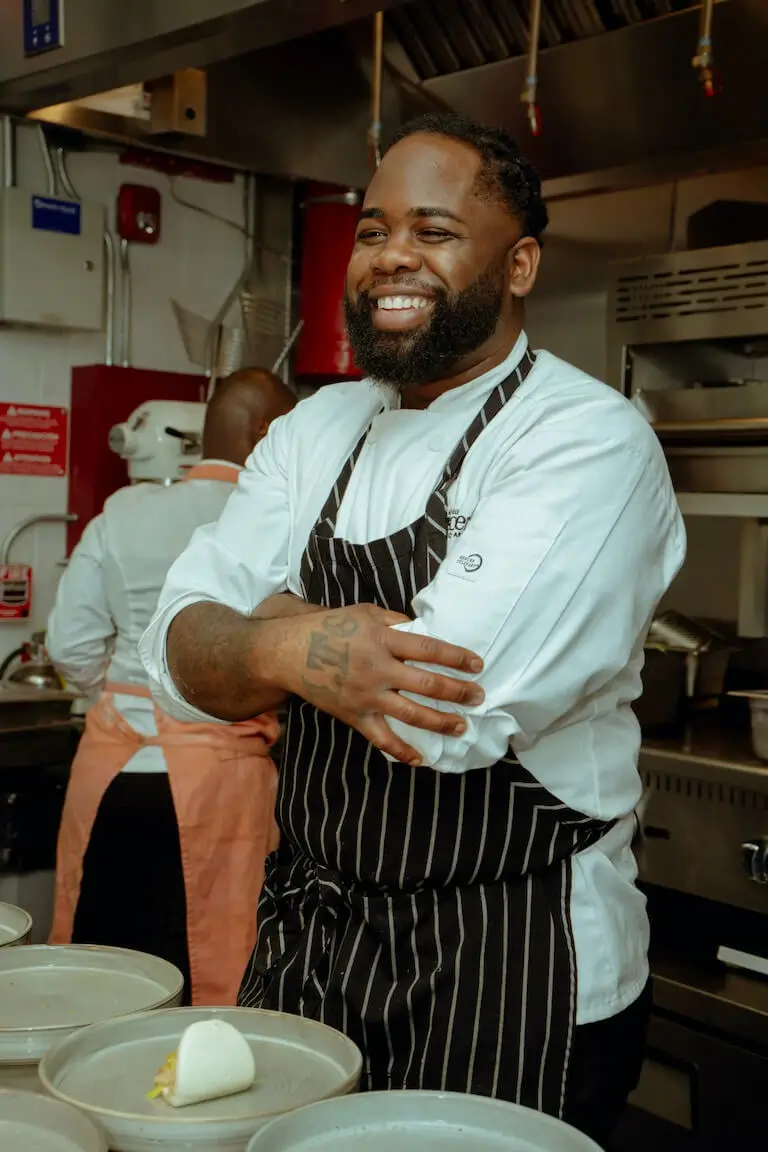
From managing fast-casual restaurants to discovering his true passion in the culinary arts, Rodney’s journey led him to where he belongs.
Finding His Place in the Kitchen
As he approached the age of 30, Rodney started looking at what hadn’t been working for him and what he was good at, including cooking, which was something he enjoyed in his personal time.
“I was getting great at flavors,” he says. “I was great at getting it on the plate. It may not have been pretty at that time, but it was real good food. And I got more and more people asking me, ‘Why don’t you go to school for it?’”
So, Rodney began reaching out to several chefs in Atlanta on Instagram. He just wanted to go in, unpaid, and see whether being a Chef was something he would want to do.
“Just because of my enjoyment of being around food, being in management in the food industry,” he says, “I want to see the creations that you can make out of food.”
One of the chefs Rodney connected with was Demetrius Brown, who was running Heritage Supper Clubs and needed some hands.
“The first thing I joined him with, Food Network was there.” Rodney says. “There was a lot of photography going on.”
Shortly after connecting with Demetrius, Rodney was on a family trip where he helped put on a brunch for his in-laws. His wife’s cousin asked Rodney why he hadn’t signed up for school yet to become a chef if he enjoyed cooking so much. That was the deciding moment for Rodney. He started looking into culinary schools and a few months later, he was enrolled at Escoffier.
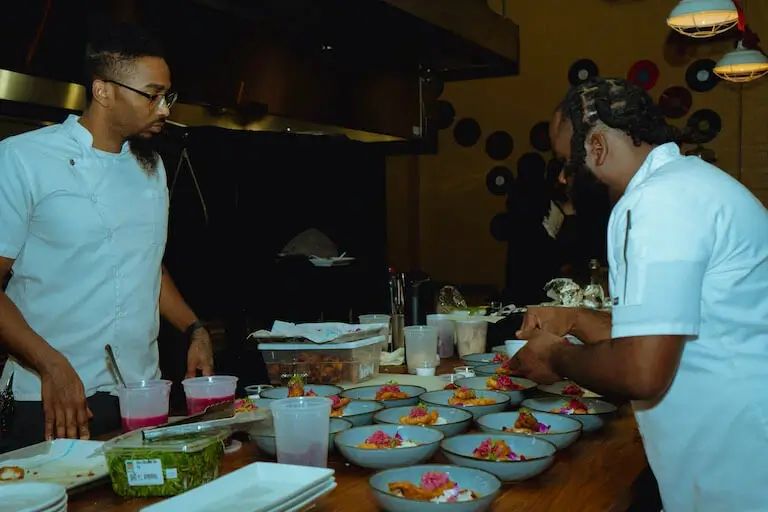
Chef Demetrius’ mentorship played an important role in helping Chef Rodney find his space in the culinary world.
How Culinary School Served as a Launchpad
Culinary school did more than teach Chef Rodney cooking techniques. It reconnected him with childhood experiences.
One of the first things culinary school helped Rodney with was his fear of baking cookies. After a previous attempt went wrong — “I thought I was my dad, but I think I used too much baking soda. It was terrible.” — he carried a lingering anxiety into the program.
“I was looking through the segments like, ‘I hope they don’t have cookies in here because I know I’m going to mess them up,’” he says.
But by learning to follow the techniques and trust the process, Rodney overcame that fear and discovered that with the right foundation, anything can be possible.
His culinary school experience also touched on his past in an even bigger and more meaningful way. During an assignment at Escoffier, Rodney was asked where he saw himself fitting in when it comes to culinary, and his Southern family background came to mind.
“My mother is from the Carolinas. That’s where I spent a lot of time at. A lot of whole hog barbecues, whole protein barbecues, to make the spread stretch,” he says. “So I remember things like hush puppies. That’s mainly my background of culinary, why I chose to put myself in southern food. But I want to elevate it, where individuals won’t just think it’s fried chicken.”
That revelation led him to turn his passion for cooking into an opportunity to create a cultural experience for diners.
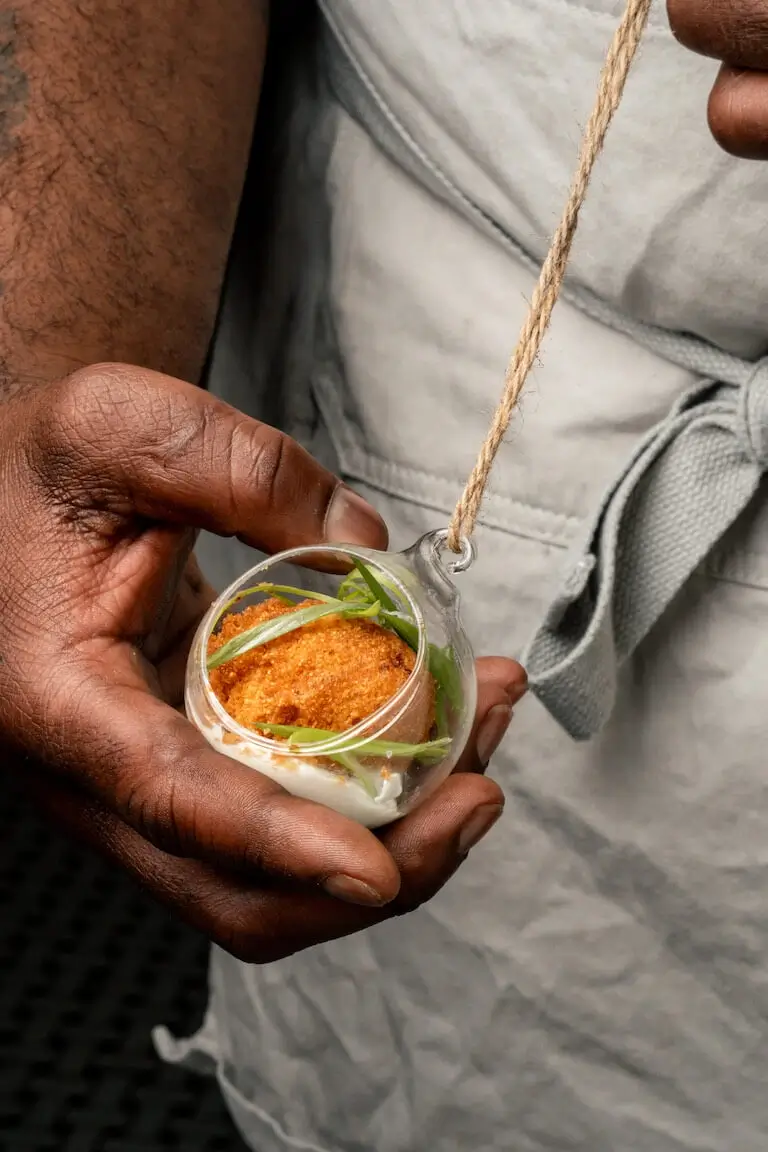
Chef Rodney elevates traditional southern food during his dinner experiences for guests, like with this hush puppy in a glass ornament.
Storytelling Through Southern Child and the 1619 Dinner Series
Chef Rodney believes food has the power to bring people “back home” emotionally, especially when life feels overwhelming. He wants every guest to leave his dinners feeling the same sense of peace, warmth, and love he grew up with — not just fed, but emotionally fulfilled.
The New South Collective
Chef Rodney is a founding member of The New South Collective, started in 2024 by a group of Atlanta-based Black chefs including Rodney, Demetrius Brown, Robert Butts, India Johnson, Christan Willis, Gary Caldwell, Jaye Smith, Carlos Granderson, and Chryssie Lewis.
The collective came together to celebrate Black excellence in the culinary world, aiming to tell the stories behind each dish while showcasing the depth, creativity, and cultural importance of Black Southern cuisine. At New South events, every course highlights not just technical skill but also the history, traditions, and personal connections behind the ingredients and recipes.
Dishes like collard greens carry a deep history in the Black community, rooted in culture, survival, and the passing down of tradition through generations.
For Rodney, being part of The New South Collective extends his mission of using food to honor his heritage while building community and inspiring the next generation of chefs. It allows him to collaborate with like-minded chefs who share a passion for history, culture, and pushing Southern cuisine forward.
Being part of the collective also inspired Chef Rodney to develop a dinner series to serve as his own personal storytelling project.
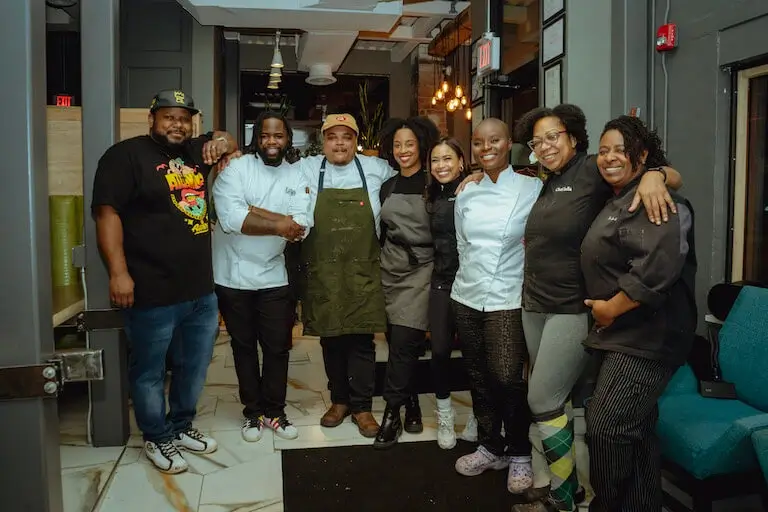
Chefs Gary Caldwell, Rodney Smith, Robert Butts, Jon’nae “Jaye” Harris, Christan Willis, India Johnson, and Dene Lynn collaborate together as part of The New South Collective.
Southern Child
In late 2024, Chef Rodney founded Southern Child, his own personal pop-up dinner series, built around elevated Southern cuisine and generational storytelling. Every course is inspired by family recipes and cultural memories, from collard greens and hush puppies to coconut cake, served with personal stories about his upbringing in North Carolina and Tennessee.
“A lot of times when I start to get that feeling that I’m overworking myself, I’m doing too much, I always say I need to go back home and get some love,” Chef Rodney says. “That’s more like my father cooking made-from-scratch biscuits at my grandmother’s house in Tennessee because everybody’s looking forward to that. That’s the experience that people get when they come to my dinners. That wholehearted feeling, that warmness.”
Within Southern Child, he curates themed events like “1619: An African Story,” which explores African American history through food, tracing ancestral ties and honoring the survival, adaptation, and creativity that shaped his family’s cooking traditions.
One such event was a 7-course meal focused on the Civil War era. These dinners pair traditional dishes with stories of his great-grandmother and ancestors, sharing the history behind the ingredients and honoring the legacy of those who came before him.
Chef Rodney’s Carolina Hush Puppies Recipe
Ingredients
- 1 cup of cornmeal
- 1/2 cup all-purpose flour
- 3 Tbsp sugar
- 1 1/2 Tbsp baking powder
- 1/2 tsp salt
- 1 large egg
- 3/4 cup buttermilk
- Half an onion minced
- 1/4 tsp cayenne pepper
Directions
- Mix cornmeal, flour, sugar, baking powder, cayenne pepper, and salt until evenly incorporated.
- In a separate mixing bowl, mix buttermilk, eggs, and minced onions until the egg is evenly blended.
- After mixing both dry and wet ingredients separately, combine in a larger mixing bowl until the batter is fully incorporated. Set aside for 10 to 15 minutes until the oil reaches 365 degrees Fahrenheit.
- Use a small ice cream scoop to drop golf ball-sized rounds (about two tablespoons each) in batches of five or six so as not to crowd the pan.
- Deep fry for 4 to 6 minutes or until hushpuppies are a deep golden brown.
- Strain hushpuppies for 3 to 5 minutes.
White horseradish dipping sauce ingredients
- 1/2 cup sour cream
- 2 Tbsp horseradish
- 2 Tbsp mayonnaise
- 1 tsp apple cider vinegar
- 1/4 tsp of salt
- 1/8 tsp black pepper
- 1 Tbsp chives, finely chopped
Directions
Mix sour cream, horseradish, mayonnaise, apple cider vinegar, salt, black pepper, and chives in a mixing bowl until fully incorporated.
Honoring Family and History Through Food
For Rodney, food is more than flavor — it’s memory, legacy, and identity. He often shares how dishes like hush puppies or black-eyed peas connect him to generations before him, to his grandmother, his great-grandmother, and the family stories passed down through their kitchens.
These are not just recipes — they are reflections of history, including the realities of enslavement, survival, and strength within the African American experience. The deeper he leaned into these stories, the more he saw that this was his lane, to tell the truth of where he comes from through carefully crafted, elevated versions of the meals his family has shared for generations.
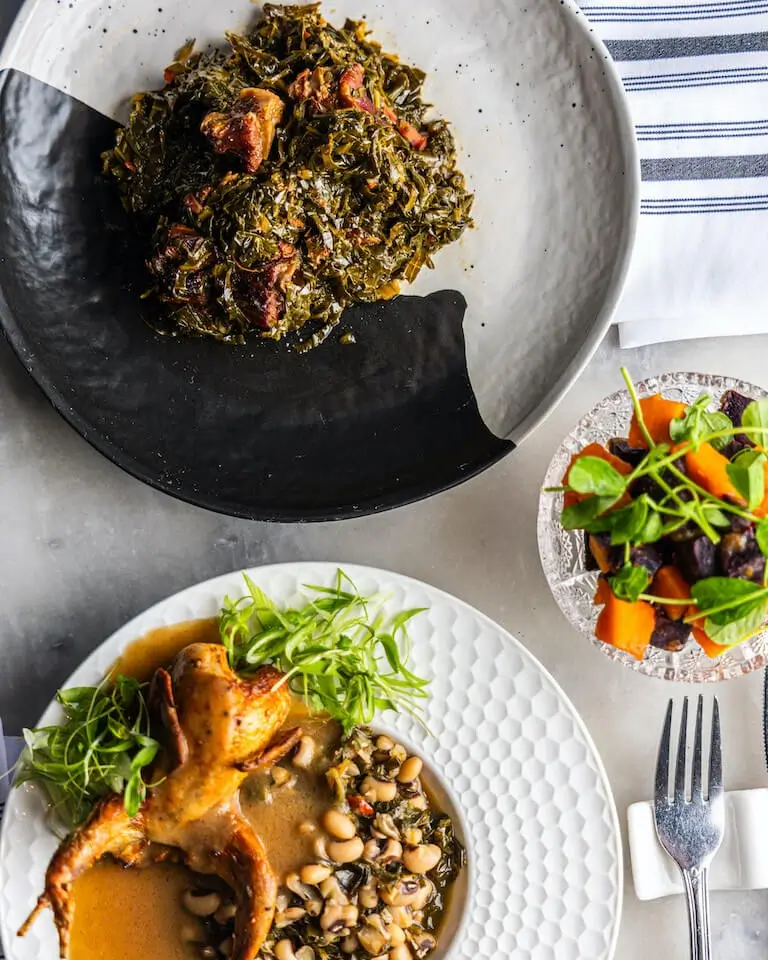
Smothered quail and collard greens are examples of elevated dishes Chef Rodney serves during pop-up dinners while sharing the history of African slaves and what they cooked to satisfy their hunger and provide food for their families.
Whether it’s collard greens or coconut cake that sparks a conversation about Sunday dinners after church, Rodney uses food to help people feel something, to remember, to reflect, and to connect. He finds joy in seeing the light in guests’ faces as they recognize familiar flavors told in new ways. It’s a simple reminder that these dishes carry meaning beyond the plate.
As he continues to grow in his career, Rodney remains grounded in his purpose to honor where he comes from, share the stories that shaped him, and invite others to feel the love, history, and meaning behind every bite.
Chef Rodney’s Advice for Aspiring Chefs
Chef Rodney encourages everyone to let their creativity in the kitchen come from their own experiences and heritage because that’s what helps make food meaningful. Focus on creating food that tastes good and tells a story, not just what looks best on the plate.
He also wants to pass on the importance of taking risks as part of the process. He’s learned through encouragement from other chefs that sometimes you don’t know what looks best until it’s on the plate.
“Be humble enough to learn so you can be a better person for tomorrow,” Chef Rodney advises. “It’s important to stay humble and open because your way isn’t the only way. Learning from others is part of becoming a better chef.”
Continuing the Legacy Through Culinary Storytelling
Chef Rodney Smith’s journey isn’t just about becoming a chef; it’s about using food to tell stories that matter. Through every plate he serves, he honors his roots, invites others into his family’s history, and creates moments that feel like coming home. Whether it’s a hush puppy that sparks a memory or a course shared over stories of the past, Rodney’s cooking is grounded in meaning.
For those who feel a calling to share their own story through food, Rodney’s path is a reminder that your background is your strength. With the right guidance — like the education found at Escoffier — that story can come to life in a way that feeds both heart and soul.
Ready to turn your passion into a purpose-driven career? Contact us to find out more about how Escoffier can help you get started.
FEELING INSPIRED BY CHEF RODNEY’S STORY? CHECK OUT THE STORIES OF THESE ESCOFFIER GRADUATES NEXT!
- From Desk Job to Pitmaster: A Culinary Journey with Escoffier Graduate Michael Fields
- Beyond Borders: A Tenacious Culinary Graduate’s Inspiring Journey from Ecuador to Austin
- After Homelessness, An Austin Pastry Student Finds Stability in the Kitchen
*Information may not reflect every student’s experience. Results and outcomes may be based on several factors, such as geographical region or previous experience.

